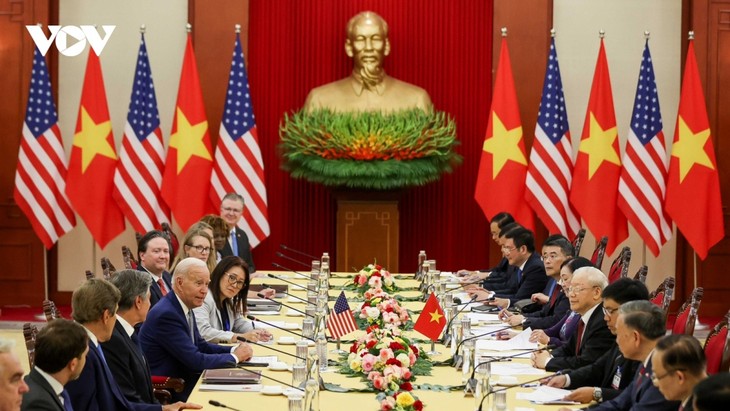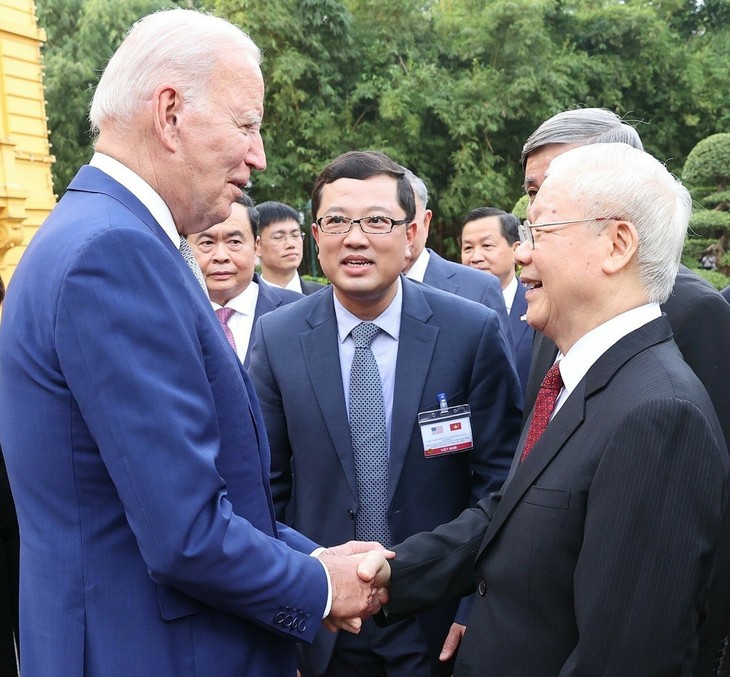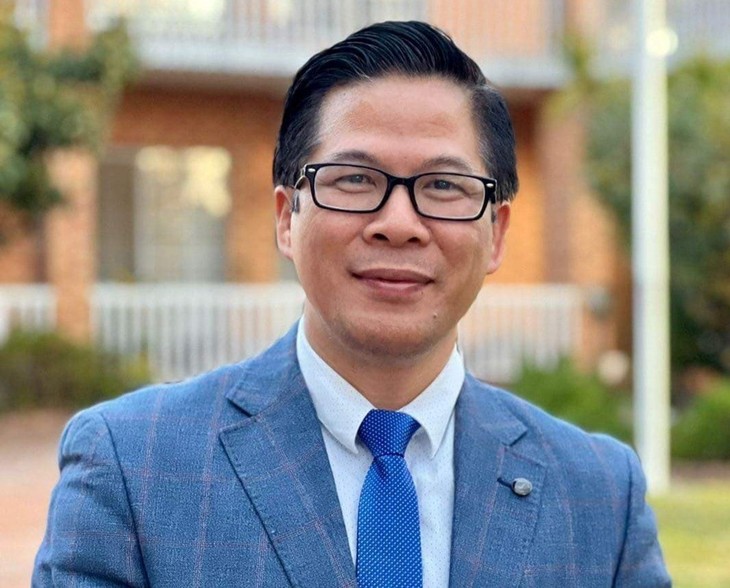 Vietnamese Party General Secretary Nguyen Phu Trong and US President Joe Biden hold talks in Hanoi on September 10, 2023. Vietnamese Party General Secretary Nguyen Phu Trong and US President Joe Biden hold talks in Hanoi on September 10, 2023.
|
Bao Tram: Thank you, Dr. Nguyen Hong Hai, for granting VOV this interview. What is the significance of Vietnam and the US upgrading from a comprehensive partnership to a comprehensive strategic partnership?
Hong Hai: I believe the upgrade in bilateral relations, whether to a strategic partnership or a comprehensive strategic partnership, is what both countries have aspired to for many years. The upgrade is in their strategic interests. I view the significance of the upgrade in three dimensions:
The first dimension is the perception of mutual importance. From the US perspective, first, Vietnam has an important role to play in its grand Asia-pivot strategy, initiated by the Obama administration, which has been continued under the name ‘Indo-Pacific Strategy’ by the Trump administration and enhanced by the Biden administration.
Second, Vietnam is emerging as a critical hub in the regional and global supply chain. Vietnam is becoming a new manufacturing destination for American investors in various fields, especially in the high-tech domain.
Third, Vietnam is becoming a high-potential market with nearly 100 million consumers for American products.
Fourth, a prosperous and resilient Vietnam that is capable of resisting shared security challenges is good for the US.
From the Vietnamese perspective, first, the US still leads in innovation and advanced technology. Vietnam needs American technology for its advancement. Second, the US is the world's largest consumer market and financial center. Vietnam's economy is export oriented. Hence, a more favorable and open accessibility for Vietnamese exports to the US market is beneficial for Vietnam's economy. Third, the US is an indispensable strategic counterbalance in an environment and region where coercive and bullying actions and illegal encroachment on another's sovereignty are undermining international law and concerning small countries like Vietnam in the region.
The second dimension is benefits at the bilateral level. The upgrade means an increase of bilateral trust. The upgrade enables more coordinated bilateral cooperation in different areas. The upgrade also deepens cooperation in addressing war legacies. The upgrade will drive the current bilateral relationship to full normalization. At the moment, the US still treats Vietnam as a non-market economy, while more than 70 countries, including allies of the US, have already recognized Vietnam as a market economy. And the upgrade means the two are committed to protecting each other’s interests in an appropriate way.
The third dimension is a message to the region and the world. First, the normalization of diplomatic relations between Vietnam and the US already sends a clear message to the region and the world, as President Joe Biden told the UN General Assembly last year, that "adversaries can become partners, overwhelming challenges can be resolved, and deep wounds can heal".
With the upgrade, they are not just normal partners, but more than that, they are comprehensive strategic partners. Second, the US already has allies in the region. With the upgrade, the US reaffirms its perception of Vietnam as a critical partner in the region. Third, having a strategic partnership with Vietnam means the US is committed to staying involved in the region and in Southeast Asia.
Bao Tram: After the comprehensive strategic partnership was established last September on the occasion of the State visit to Vietnam by President Biden, in what areas has mutual trust been enhanced?
Hong Hai: Trust is built and earned on various elements. Trust in Vietnam-US relations has been built for nearly 30 years now, since the two countries normalized diplomatic ties in 1995. The comprehensive strategic partnership was established nine months ago. One should not expect to see any breakthroughs in bilateral cooperation in such a short period of time, especially politically. However, we have seen some progress since the beginning of 2024 –the first foreign minister-level dialogue held in Washington in March and the US taking concrete steps toward recognizing Vietnam as a market economy. This apparent increase in mutual trust seems a direct result of establishing the comprehensive strategic partnership last year.
 Party leader Nguyen Phu Trong shakes hands with US President Joe Biden at the Presidential Palace in Hanoi on September 10, 2023. (Photo: VNA) Party leader Nguyen Phu Trong shakes hands with US President Joe Biden at the Presidential Palace in Hanoi on September 10, 2023. (Photo: VNA)
|
Bao Tram: On May 8, the US Department of Commerce held an online hearing on considering Vietnam a market economy. What would that recognition mean for Vietnam?
Hong Hai: I think granting Vietnam market economy status is the right thing for the US to do in the context of a comprehensive strategic partnership. As I mentioned, the US is at odds with 70 other countries, including US allies like Japan, Canada, the UK, and Australia, who have already recognized Vietnam as a market economy.
I think granting Vietnam market economy status would benefit both countries, not just Vietnam, and would increase mutual trust.
Bao Tram: How is this mutual trust expressed in security and defense cooperation?
Hong Hai: Trust in the field of security and defense cooperation is increased in tandem with visits, dialogues, and cooperation in addressing war legacies, peacekeeping, and training. Since the upgrade in bilateral relations last September, noteworthy activities have included a defense policy dialogue (9/2023), a visit by Commanding General of the US Army Pacific (USARPAC) General Charles Flynn (11/2023), and the 10th Vietnam-US Dialogue on Asia-Pacific (3/2024).
But it needs to be acknowledged that security and defense cooperation is still limited and remains a sensitive issue in the regional context. I believe the two countries need to find more appropriate ways to enhance cooperation in this field. And there need to be more efforts on both sides to earn trust in this area.
 Dr. Nguyen Hong Hai (Photo: VinUni) Dr. Nguyen Hong Hai (Photo: VinUni) |
Bao Tram: Significant improvements have been seen in multiple areas, but human rights is an area where the two sides need to better understand and respect each other, right? What’s your comment?
Hong Hai: Here, first of all, it’s important to note that human rights is one of the three pillars of US foreign policy. The US always looks at human rights issues in all countries, including its allies. So the US bringing up human rights in its relationship with Vietnam is quite normal.
Only when it’s treated as a normal issue in any relationship with the US, can it be addressed in a smart way. The smartest way is to take a proactive approach to the issue. It’s normal for two countries with different political systems and value systems, not to mention asymmetric development levels, to have divergent views and approaches when it comes to human rights. In addition to pursuing human rights progress on our own, we need a candid and constructive dialogue with the US on human rights issues. The right way to enhance trust in the field of human rights, I believe, is to properly understand our differences and avoid "blaming and shaming".
Bao Tram: In what other areas can or should mutual trust be demonstrated?
Hong Hai: I think there are many areas of cooperation that can increase trust between the two countries, including education and people-to-people exchanges. Trust must be earned by both sides. To earn trust, promises must be kept, candid and constructive dialogues must be regularly conducted, and mutual respect must be the guiding principle.
Bao Tram: So you agree, then, with Party leader Nguyen Phu Trong who said during President Biden’s visit to Vietnam last year that the Comprehensive Strategic Partnership for peace, cooperation and sustainable development between the two countries is based on respect for the basic principles that guide the relationship, including respect for the UN Charter, for international law and political institutions, and for the independence, sovereignty, and territorial integrity of both nations.
Thank you, Dr. Nguyen Hong Hai, for this interview!
Hong Hai: Thank you very much for inviting me today. I hope the relationship between Vietnam and the US will continue to develop on the foundation of the comprehensive strategic partnership established last year. Thank you!
Dr. Nguyen Hong Hai is a Senior Lecturer in the College of Arts and Sciences at VinUniversity, Adjunct Associate Professor at the University of Sunshine Coast, and Adjunct Senior Lecturer in the School of Justice of Queensland University of Technology.